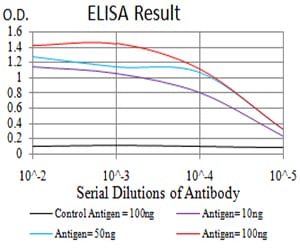
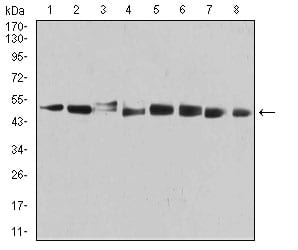
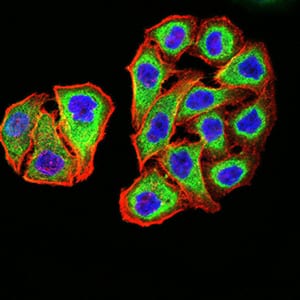
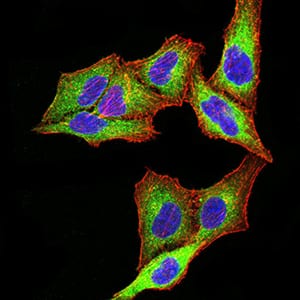
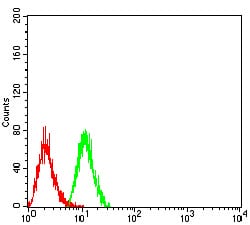
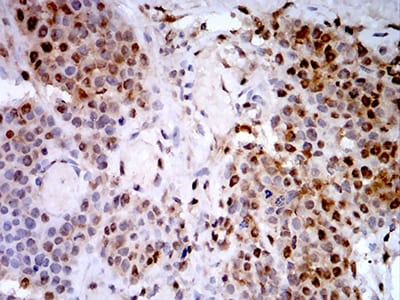
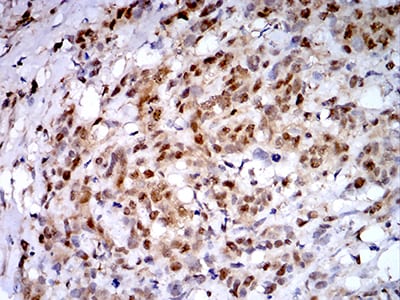
| WB | 咨询技术 | Human,Rat,Monkey |
| IF | 咨询技术 | Human,Rat,Monkey |
| IHC | 1/200 - 1/1000 | Human,Rat,Monkey |
| ICC | 1/200 - 1/1000 | Human,Rat,Monkey |
| FCM | 1/200 - 1/400 | Human,Rat,Monkey |
| Elisa | 1/10000 | Human,Rat,Monkey |
| Aliases | TBP1 |
| Entrez GeneID | 5702 |
| clone | 1G10C9 |
| WB Predicted band size | 49kDa |
| Host/Isotype | Mouse IgG1 |
| Antibody Type | Primary antibody |
| Storage | Store at 4°C short term. Aliquot and store at -20°C long term. Avoid freeze/thaw cycles. |
| Species Reactivity | Human,Rat,Monkey |
| Immunogen | Purified recombinant fragment of human *** (AA: 53-152) expressed in E. Coli. |
| Formulation | Purified antibody in PBS with 0.05% sodium azide |
+ +
以下是关于PSMC3抗体的3篇代表性文献示例(注:以下内容为模拟,实际文献需通过数据库检索确认):
1. **文献名称**:*PSMC3 regulates cell cycle progression by modulating Sp1/NFκB signaling in hepatocellular carcinoma*
**作者**:Li Y, et al.
**摘要**:本研究通过Western blot和免疫组化(使用PSMC3抗体)发现,PSMC3在肝癌组织中高表达,并通过调控Sp1/NFκB通路促进肿瘤细胞周期进展。
2. **文献名称**:*Proteasomal ATPase subunit PSMC3 loss disrupts synaptic protein homeostasis in Alzheimer’s disease models*
**作者**:Smith J, et al.
**摘要**:利用PSMC3抗体检测发现,阿尔茨海默病模型中PSMC3表达降低,导致突触蛋白质稳态失衡,提示其与神经退行性病变的关联。
3. **文献名称**:*A structural analysis of the 19S proteasome subunit PSMC3 using cryo-EM and antibody-based epitope mapping*
**作者**:Chen R, et al.
**摘要**:通过冷冻电镜和PSMC3特异性抗体表位定位,揭示了PSMC3在19S蛋白酶体复合物中的构象变化及其底物识别机制。
建议通过PubMed或Google Scholar检索关键词“PSMC3 antibody”或“PSMC3 proteasome”获取最新具体文献。
The PSMC3 antibody targets the Proteasome 26S subunit, ATPase 3 (PSMC3), a critical component of the 19S regulatory particle in the 26S proteasome complex. The 26S proteasome is responsible for ubiquitin-dependent protein degradation, a process essential for maintaining cellular homeostasis, regulating cell cycle progression, and degrading misfolded or damaged proteins. PSMC3. also known as TBP1 (Tat-binding protein 1), is one of six AAA-ATPase subunits within the 19S complex, which recognizes polyubiquitinated substrates, unfolds them, and translocates them into the 20S catalytic core for proteolysis.
PSMC3 antibodies are widely used in research to study proteasome dynamics, protein turnover mechanisms, and cellular stress responses. They are employed in techniques such as Western blotting, immunoprecipitation, and immunofluorescence to detect PSMC3 expression levels, localization, and interactions. Dysregulation of PSMC3 or proteasome activity has been implicated in various diseases, including cancer, neurodegenerative disorders (e.g., Alzheimer’s and Parkinson’s), and autoimmune conditions. For example, reduced proteasome function is linked to protein aggregation in neurodegeneration, while cancer cells often upregulate proteasomes to support rapid proliferation.
Research using PSMC3 antibodies also explores the effects of proteasome inhibitors (e.g., bortezomib) in therapeutic contexts, particularly in cancer treatment. These studies highlight PSMC3's role as a biomarker for proteasome activity and a potential target for modulating proteostasis in disease.
×